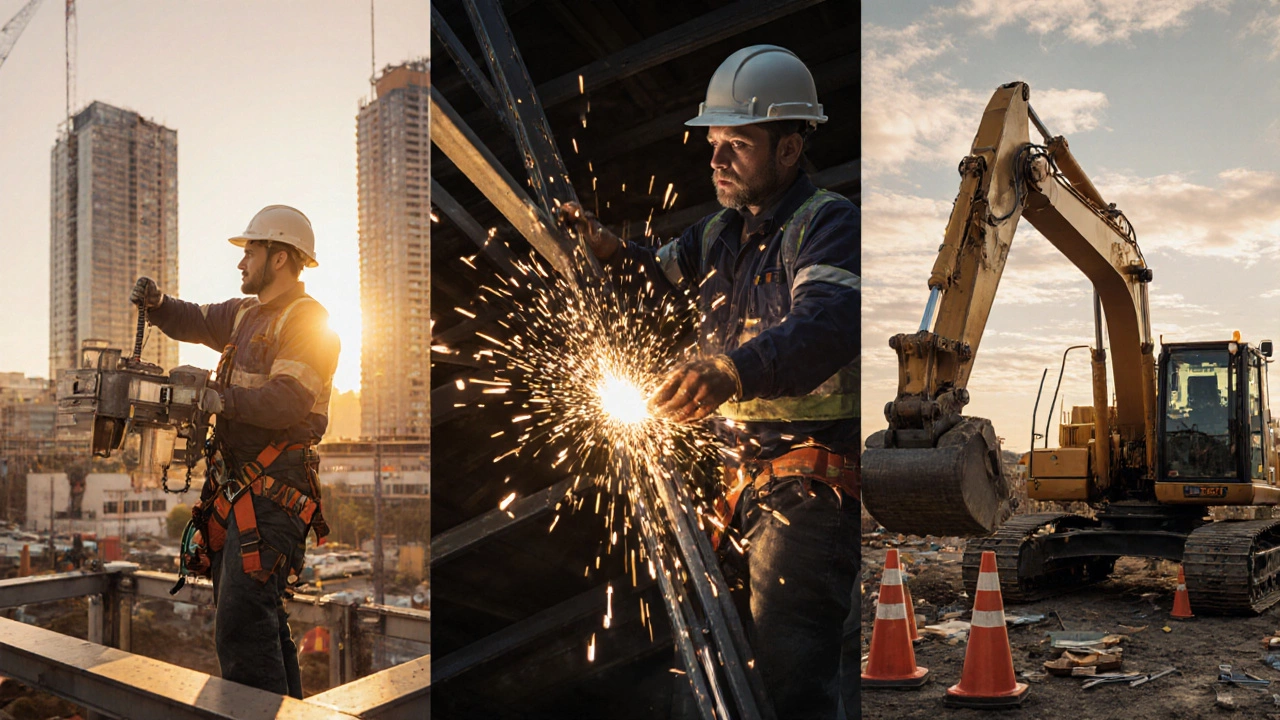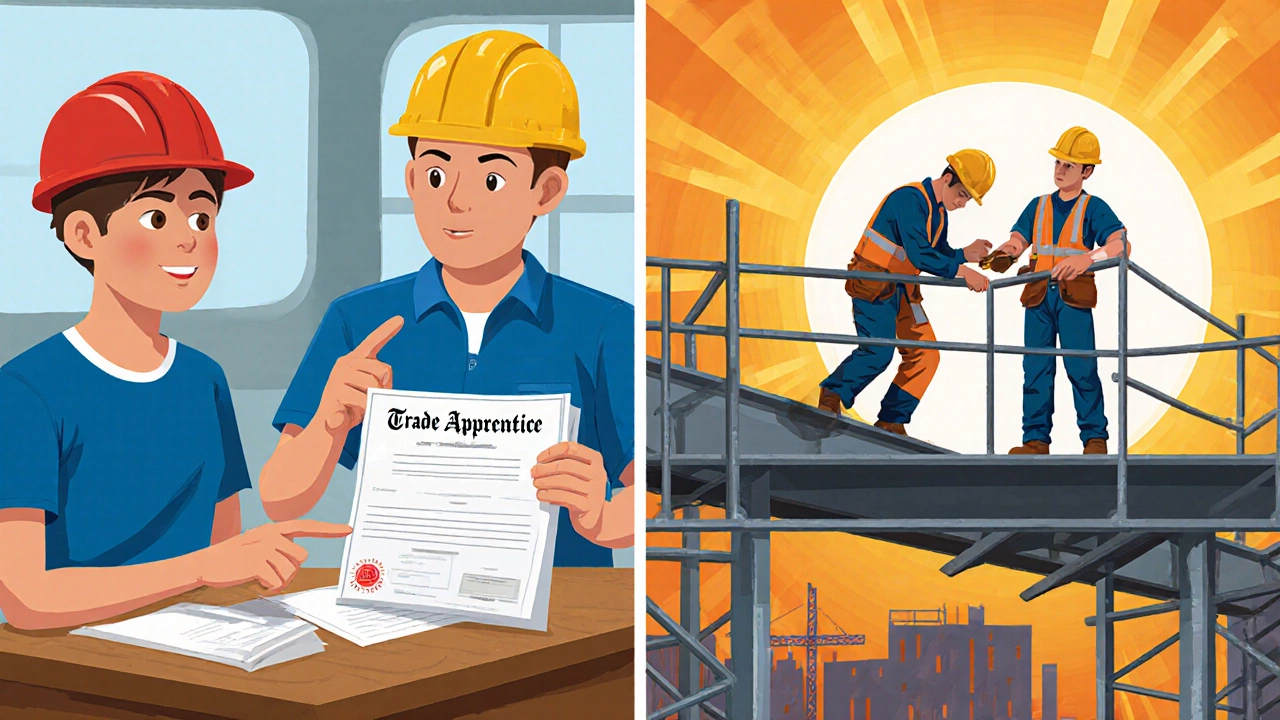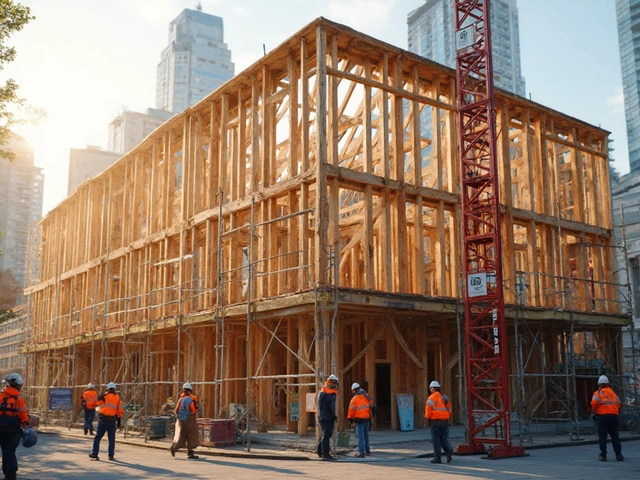
Construction Labor Salary Calculator
Calculate Your Earnings
How It Works
Based on New Zealand construction industry data, this calculator estimates your potential annual earnings by considering:
- Base Salary $150,000
- Location Bonus +15%
- Experience Bonus +20%
- Overtime Potential +$15,000
Your Estimated Salary
Quick Takeaways
- Elevator installers, ironworkers, and heavy‑equipment operators top the pay chart, often earning NZ$120k‑$150k a year.
- Certificates and apprenticeships are the fastest routes to these salaries.
- Location matters - Auckland and Wellington pay 10‑15% more than regional centres.
- Experience and union membership can add another 20% to your earnings.
- Negotiating overtime and specialised allowances pushes the total compensation even higher.
When you hear people talk about "high‑paying labor jobs" they usually picture managers or engineers, but the truth is that a handful of hands‑on trades actually bring in the biggest paychecks. In 2025 the construction sector in New Zealand still suffers a skills shortage, and that scarcity drives wages up for the right trades. If you’re wondering which highest paying labor jobs you can aim for, this guide breaks down the numbers, the required credentials, and the day‑to‑day reality of each role.
What counts as a “construction labor job”?
Construction labor job is a category of hands‑on work that supports the physical build of structures, from residential homes to commercial towers. These jobs usually require manual skill, on‑site presence, and often a trade‑specific certification. Unlike project managers or architects, labor roles are executed directly on the job site, which is why they’re sometimes called "skilled trades".
Why these jobs pay more than others
Several forces push wages up for certain trades:
- Skill scarcity: Few workers have the specialized training for complex systems like elevators or high‑rise steel framing.
- Safety risk: Jobs that involve heavy machinery, heights, or confined spaces demand higher pay to offset risk.
- Certification requirements: Obtaining a recognised credential (e.g., a New Zealand Construction Trade Certificate) takes time and money, so employers reward those who already hold it.
- Geographic demand: Urban hubs such as Auckland, Wellington, and Christchurch have a constant pipeline of high‑rise projects, inflating local rates.
- Union leverage: Many high‑paying trades are unionised, leaving members with collective bargaining power for better wages and benefits.

Top 8 highest‑paying construction labor jobs in 2025
Below is a snapshot of the trades that consistently sit at the top of the pay ladder. Figures are average annual earnings in New Zealand dollars (NZ$) based on 2024‑2025 industry surveys and government wage data.
| Job | Avg Annual Salary (NZ$) | Required Certification | Typical Experience | Growth Outlook (2025‑2030) |
|---|---|---|---|---|
| Elevator Installer | 150,000 | Trade Certificate - Mechanical/Elevator | 3‑5 years (apprenticeship) | +12% |
| Ironworker | 138,000 | Certificate in Steel & Metal Fabrication | 4‑6 years | +10% |
| Heavy‑Equipment Operator | 130,000 | Heavy‑Machinery Licence (CPC) | 2‑4 years | +9% |
| Electrical Contractor (Journeyman) | 122,000 | Electrifier Certificate Level 2 | 5‑7 years | +8% |
| Plumber (Specialist) | 118,000 | Plumbing & Gasfitting Certificate | 4‑6 years | +7% |
| Welder (Industrial) | 112,000 | Welding Certificate - MIG/TIG | 3‑5 years | +6% |
| Pipefitter | 108,000 | Pipefitting Certificate | 3‑5 years | +5% |
| Drywall Installer | 95,000 | Construction Trade Certificate - Drywall | 2‑4 years | +4% |
Notice how the top five all require a formal trade certificate and several years of on‑the‑job training. This isn’t a coincidence - these qualifications guarantee a baseline level of safety and expertise that employers are willing to pay for.
Breaking into a high‑paying trade
If you’re starting from scratch, the fastest path is an apprenticeship that blends paid work with classroom learning. Here’s a step‑by‑step plan you can follow:
- Identify the trade that aligns with your interests and physical abilities.
- Search the New Zealand Apprenticeship Service for registered programmes.
- Apply for an apprenticeship - most require a secondary school diploma and a clean safety record.
- During the apprenticeship, aim to earn the relevant Trade Certificate as early as possible; many employers will cover the cost.
- After qualification, join a union (e.g., E tū) to access collective wage agreements.
Even if you’re already in a lower‑paid role like general labourer, many employers will sponsor you for further training if you show reliability and a willingness to learn.
How location and experience boost earnings
Salary figures can vary dramatically based on three key factors:
- Region: A heavy‑equipment operator in Auckland can earn up to 15% more than the same role in Dunedin because of higher project density.
- Experience tier: Move from “journeyman” to “lead” or “foreman” and you could see a 20‑30% bump.
- Special allowances: Night‑shift differentials, travel allowances for remote sites, and overtime premiums add roughly NZ$10‑20k per year.

Salary negotiation tips for labor workers
Negotiating isn’t just for office roles. Here’s a quick cheat‑sheet you can use before your next performance review:
- Research the latest market rates on sites like PayScale or the New Zealand Ministry of Business, Innovation & Employment (MBIE) Wage Survey.
- Document your contributions - hours of overtime, safety certifications earned, or projects completed under budget.
- Present a clear ask: rather than saying “I want more money,” say “Based on the industry benchmark of NZ$130k for a Heavy‑Equipment Operator in Auckland, I’d like to adjust my salary to NZ$135k.”
- Be ready to negotiate non‑salary benefits - extra paid leave, training credits, or a company vehicle.
Common pitfalls and how to avoid them
Even lucrative trades have traps. Keep an eye out for these:
- Skipping certification: Some employers will pay a higher hourly rate but demand you get the certificate later. That can backfire if you’re unable to complete it.
- Ignoring health & safety: High‑risk jobs increase the chance of injury, which can stall your career. Always use proper PPE and attend safety briefings.
- Staying in one role too long: Without upskilling - e.g., learning a new type of crane operation - you risk hitting a wage ceiling.
Future outlook: what to expect after 2025
The construction sector is shifting toward modular building, green technologies, and automated equipment. This means two things for labor workers:
- Trades that adapt to new tech - like robot‑assisted welding or electric‑vehicle charging infrastructure - will see even higher wage growth.
- Traditional roles that resist automation (e.g., manual bricklaying) may experience slower salary increases.
Staying current with industry certifications and embracing emerging tools will keep you on the high‑pay track.
Which construction labor job pays the most in New Zealand?
Elevator installers currently top the list, with average earnings around NZ$150,000 per year. The role requires a specialized mechanical trade certificate and 3‑5 years of apprenticeship.
Do I need a university degree to become an ironworker?
No. Ironworking is a skilled trade that you can enter via a Trade Certificate in Steel & Metal Fabrication, usually completed through an apprenticeship.
How much overtime can I expect as a heavy‑equipment operator?
Overtime is common on large sites. Many operators log 10‑20 extra hours per week during peak construction periods, which can add NZ$10,000‑NZ$20,000 to annual earnings.
Is union membership mandatory for high‑paying trades?
It’s not legally required, but most high‑paying trades are unionized. Unions negotiate collective agreements that boost base wages, provide health benefits, and protect against unsafe conditions.
What’s the best way to start an apprenticeship in 2025?
Visit the New Zealand Apprenticeship Service website, filter by the trade you want, and apply directly to registered employers. Keep your résumé focused on reliability, safety certifications, and any relevant school projects.
Bottom line: the most lucrative labor jobs aren’t mystery roles - they’re trades that need solid training, safety awareness, and a willingness to keep skills fresh. Pick a path, get certified, and let the market do the rest.




